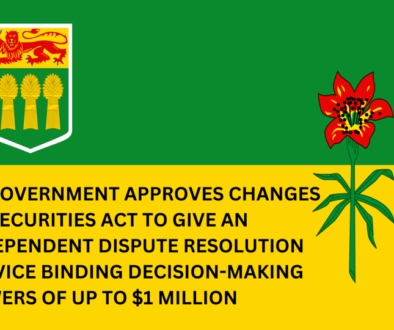PCMA Comment Letter On Its Opposition To Give OBSI Binding Decision-Making Powers Of Up To $350,000
Investor protection is critical for a well-functioning capital marketplace. This works in tandem with having fair and efficient capital markets to allow registrants to raise capital for companies to grow their business and create jobs to stimulate the economy. It is an interconnected capital-raising ecosystem. If one part of the ecosystem does not work, then it affects the other.
Private Capital Markets Are Vital for Capital Raising in Canada
The Private Capital Markets Association of Canada (the PCMA) has conducted a thorough review of the “Proposed Amendments”1 by the Canadian Securities Administrators (the CSA) that seek to give the Ombudsman for Banking Services and Investments (OBSI) binding decision-making powers for up to $350,000. The implications of giving such unequivocal expanded powers to OBSI cannot be underestimated given that over 70% of capital raised in Canada (just under $90 billion) for the first nine months of 2023 was made under prospectus exemptions in the private markets. Investor protection and confidence in the private markets are critical to allow companies to grow their business while providing jobs and expanding the Canadian economy.
PCMA Advocacy Website – Fair and Balanced Regulation
The PCMA believes in fair and balanced regulation. The PCMA encourages members of the CSA and others to visit the PCMA’s new dedicated advocacy website called Fair and Balanced Regulation (www.fairandbalancedregs.com). This website will be used as part of the PCMA’s ongoing advocacy involving securities law and the private capital markets starting with the Proposed Amendments. The PCMA has published articles about the Proposed Amendments and will be adding its comment letter and related articles, videos and podcasts as part of education and training about existing and proposed securities law in Canada.
Below is from the Executive Summary of the PCMA Comment Letter.
Proposed Amendments are Unfair by Design
The PCMA believes that the Proposed Amendments do not adequately balance investor protection with the necessity for fair and efficient capital markets. The CSA’s proposed framework may impose significant financial burdens on firms without providing the proportional procedural safeguards as recognized under administrative law.
- The CSA seeks to maintain OBSI’s current business and operations without giving firms any additional procedural rights commensurate with giving OBSI binding decision-making powers.
- The PCMA notes that the data on education and settlement results provided by the CSA does not support a power imbalance between complainants and firms, particularly with certain types of investors, which is the CSA’s justification in part, for giving OBSI binding decision-making powers.
- OBSI’s data suggests there is no power imbalance based on the education of complainants where over 67% have a college, CEGEP or other non-university certificate or diploma or university certificate or Bachelor’s Degree or higher. The PCMA also believes that accredited investors and permitted clients have sufficient wealth, education and experience and do not need the protections of the Proposed Amendments and should be excluded as eligible complainants under the proposed framework.
- OBSI’s data shows only 8% of cases settled below OBSI’s recommended amount and only 4% when looking at the majority of settlements, which have compensation amounts between $1 and $49,999.
- The CSA assumes OBSI’s recommended settlement amounts are always correct. The PCMA has concerns since OBSI has not published a detailed loss calculation methodology for the industry to understand the basis of its decisions involving illiquid private market investments. OBSI has only provided general statements on its website about such matters. OBSI’s approach, as it stands, lacks the specificity that firms require to anticipate and understand the potential financial outcomes of a dispute.
- The PCMA is concerned that the CSA has arbitrarily lowered the bar for the definition of a “complaint” where any “expression of dissatisfaction” involving trading or advising activities could trigger a review by a registrant and/or OBSI. The PCMA does not believe there is evidence to support such a change, it is an overly broad definition and it should be more precisely defined, especially if OBSI is to be giving binding decision-making powers. This situation is compounded if OBSI solely determines whether a matter is a single complaint or multiple complaints, with each complaint being subject to a maximum $350,000 limit. It is crucial for the CSA to ensure the definition of a “complaint” is not ambiguous and ensure fairness, particularly if binding economic outcomes are at stake for firms.
- The Proposed Amendments do not impose any financial costs on investors for making a complaint. The Proposed Amendments do not incorporate mechanisms to discourage or penalize complainants for making complaints that are frivolous, vexatious or without merit. It encourages ‘free-riding’. Other legal systems often have checks and balances, such as ‘loser pays’ rules to prevent such actions. The PCMA believes that the revised definition of a complaint coupled with no financial costs or disincentives on complainants will open the floodgates of complaints. If so, the sheer number of complaints may overwhelm registrants and OBSI since investors have nothing to lose in trying to characterize any failed investment as a suitability failure reviewable by OBSI. This will also exponentially drive up the costs on registrants for dealing with complaints and OBSI participation fees charged to registrants for its services in order to pay for the proposed framework. The PMCA does not believe the initial and ongoing cost estimates prepared by the Ontario Securities Commission (the OSC) fairly reflect the true total cost of the Proposed Amendments.
- The CSA has not provided any additional procedural protections one would expect to be afforded under administrative law to registrants who could be subject to adverse awards of up to $350,000 per complaint. The CSA’s proposed “essential process test” appears to be a label created by the CSA, giving OBSI discretion to determine its complaint review process in the absence of any published procedures. The PCMA submits this creates a potential risk of bias, potential interpretational error and a lack of precedent among complaint reviews undertaken by OBSI investigation staff. The essential process test assumes OBSI’s processes are fair and correct which the CSA suggests is important to resolving complaints quickly. The PCMA notes that speed does not necessarily equate with fairness.
- The PCMA does not believe the OSC has adequately reviewed alternatives to OBSI including those considered in IIROC’s2 review of its Arbitration Program in 2022 titled “IIROC Arbitration Program Working Group Recommendations”3 (the IIROC Report). There was no review included in the Proposed Amendments of the mediation and conciliation services offered by the Autorité des Marchés Financiers (AMF) or those offered by the Financial Industry Regulatory Authority in the United States which the PCMA believes are more relevant comparisons.
- The PCMA believes the CSA needs to clarify how OBSI’s review works in connection with multiple proceedings involving, for example, other CSA members involving the same subject matter. In addition, PCMA recommends that the Proposed Amendments should be amended to clarify that complainants cannot undertake further legal proceedings for amounts over the maximum award where the cause of action is the same.
- The PCMA has engaged the services of Purves Redmond Limited (PRL), an insurance broker who has reviewed the Proposed Amendments. The insurance broker, in discussions with certain errors and omissions (E&O) underwriters, has noted potential concerns about the insurability of claims arising from complaints in connection with the Proposed Amendments. The PCMA and PRL invite the CSA, OBSI and others to participate in a Working Group to discuss E&O insurance for registrants in Canada, the challenges faced by underwriters in underwriting the proposed framework, and a discussion about possible solutions.
- The PCMA’s specific responses to the CSA’s questions based on OBSI being given binding decision-making powers are set out in the body of the comment letter. Select concerns are set out below.
- If jurisdictions designate or recognize OBSI as the identified ombudservice at different times, then this would result in a patchwork of regulation involving dispute resolution services in Canada. This should be discouraged.
- If OBSI is granted binding authority in the dispute resolution process, the final decision should be binding on both parties and not just a firm. The current approach is one-sided and any decision should always be mutually binding on both complainants and firms if they seek to engage in a dispute resolution process with OBSI if given binding decision-making powers.
- The parties should have 90 days after a final recommendation to determine if they seek to object and a further 90-days after a final decision to determine whether they will seek judicial review.
- If binding decision-making is granted to OBSI, the PCMA believes OBSI’s settlement limit should be reduced to a maximum of $10,000 representing the vast majority of complaints which closed based on monetary compensation recommended by OBSI. The PCMA has no concerns with OBSI maintaining its current limit of $350,000 for non-binding recommendations.
- The PCMA has significant concerns that the proposed framework has no appeal rights. The right to appeal serves as a critical safety net, ensuring that decisions can be reviewed and potentially overturned if found to be incorrect or unjust. The complexities and nuances of securities law, coupled with the financial and reputational stakes involved in OBSI’s rulings, underscore the need for a more robust appeal process. If the CSA is contemplating an appeal right over certain amounts, then the PCMA believes a party should have a right to appeal any final decision of OBSI for amounts over $10,000. According to OBSI’s data, there are relatively few cases involving amounts over $50,000 (49 out of 546 or 9%), where almost half the cases settled below OBSI’s recommended amount (24 out of 49 or 49%), based on OBSI data. The majority of the cases are for amounts below $10,000 (384 out of 546 or 70%) and 99% of these cases settle at OBSI’s recommended amount.
- The PCMA believes the CSA should require OBSI to collect more data to allow evidence-based decisions to be made and as part of the CSA’s oversight of OBSI. This information should be publicly available on OBSI’s website. For example, the PCMA recommends a post-final decision survey be introduced and other data elements gathered such as prospectus exemption relied upon, type of investor, net assets and other data as set out in its comment letter.
- The PCMA requests that the CSA provide guidance to registrants and OBSI on how to manage a failed offering in the face of a multitude of complaints, establish a Western presence and not prohibit registrants from referring to their internal dispute resolution service provider as an ombudsman provided that they follow the guidance provided by the CSA set out in Joint CSA Staff Notice 31-351.4
In sum, the PCMA does not believe the evidence supports the Proposed Amendments and that the existing dispute resolution process is working. Furthermore, the PCMA believes the Proposed Amendments are unfair by design and do not strike the right balance between investor protection and fair and efficient capital markets. Further details regarding the PCMA views are set out in the comment letter that follows.
You can view the PCMA Comment Letter here.
See also the article in the Globe & Mail titled “Canadians regularly shortchanged in banking and investment disputes, analysis contends; Advocates are calling for the ombudsman to be granted binding authority over penalty amounts” by Jameson Berkow on February 28, 2024 with a quote from PCMA Chair David Gilkes at: https://www.theglobeandmail.com/business/article-canadians-regularly-shortchanged-in-banking-and-investment-disputes/. Below is an excerpt the relates to comments from the PCMA.
| “…The CSA proposal, however, also seeks to expand the definition of “complaint” to include “any expression of dissatisfaction,” which according to the Private Capital Markets Association of Canada runs the risk of dramatically increasing the number of complaints that could potentially be made against its members. The PCMA, which represents roughly 400 exempt market dealers [meaning they can sell securities that do not require a prospectus, such as private placements], portfolio managers and investment advisers, launched a website detailing the various reasons why it opposes granting OBSI any binding authority. In an interview, PCMA chair David Gilkes said the proposal was “unfair by design” and that, if implemented, it could become impossible for some firms to access a common form of liability insurance known as errors and omissions – or E&O – insurance [emphasis added]. “The insurance industry is telling us, the underwriters and brokers that we have spoken to, have said you might have trouble underwriting E&O insurance in the investment industry in the future if this is the type of settlements that will be given out with binding authority,” Mr. Gilkes said.Proponents counter that binding recommendations are the norm internationally, with Canada being an outlier among peers such as Britain, Australia, New Zealand, Ireland, the Netherlands, the Czech Republic, South Africa, Singapore and Taiwan. However, Mr. Gilkes said none of those countries have the power to make binding recommendations for payments as high as the OBSI limit of $350,000, with most being limited to a fraction of that amount….” |




